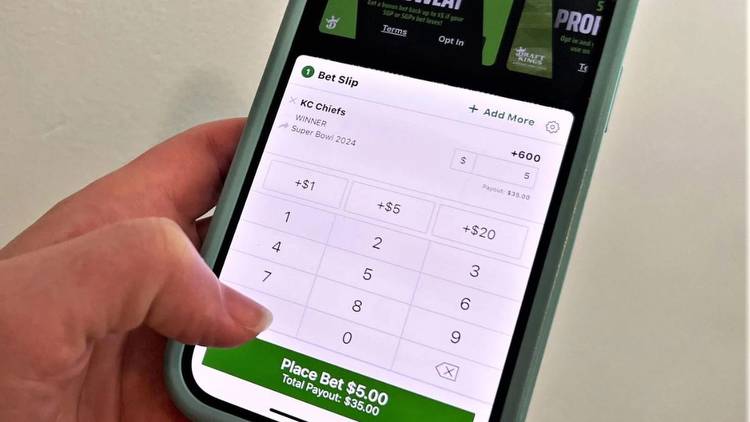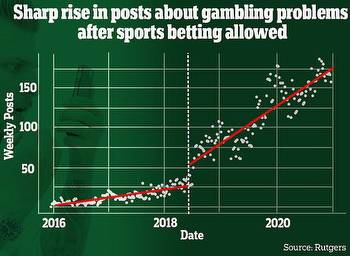Kansas experts worry about risk of gambling addiction

People in Kansas can now lose hundreds to thousands of dollars, and possibly more, with just a few taps on their phone.
The fallout from gambling addiction can be devastating — from people losing their life savings and stealing to suicide.
Up until about a year ago, Kansas only allowed gambling through the lottery and in-person at state casinos. That included traditional gambling like card games and slot machines, but not sports betting. Now people in Kansas can bet on almost every single sporting event in the world through apps on their phones.
That means practically any adult with a smartphone can place a wager on a sporting event at any time they want.
Online sports betting poses a heightened danger of addiction to Kansans. The new industry makes it legal and easier to place bets on things ranging from the outcome of games to the coin toss during the Super Bowl.
Researchers and counselors believe the state has a responsibility to provide sufficient support to fight gambling addiction if it’s going to cash in from sports wagers. Without that, Kansas could be sacrificing vulnerable residents for new business.
Timothy Fong, a psychiatrist and co-director for the UCLA Sports Gambling Studies Program, said legal sports betting apps take away the human connection required to place a wager, obscuring the weight of what some bettors are putting on the line when they place high-priced bets.
“The access, availability, anonymity,” Fong said, “and the fact that you can do this all the time and constantly get new opportunities makes it potentially addictive.”
People like Fong believe Kansas is not doing enough to combat the dangers of gambling addiction through proactive advertising campaigns or free counseling treatment.
Republican state Rep. Paul Waggoner and other lawmakers who opposed the plan to legalize sports gambling fear the social cost.
Waggoner said the state should provide more support to combat gambling addiction. And the state should also study how the massive new industry affects the population. For now, the state is flying blind.
“If we’re bringing in a couple million bucks,” Waggoner said, “at the very least, make sure it is going to help take care of some of the problems that have been caused by this.”
However, supporters of the law contend Kansas is spending more than ever on treatment for gambling addiction.
New danger of gambling addiction
The most significant danger of online sports betting is the accessibility, because the mobile apps are open 24-hours a day. Rather than traveling to a casino during certain hours of the day, bettors can place bets at any time they want from wherever they are in the state.
Fong said mobile apps also lack human connection, like interacting with casino staff and other gamblers. Or even family and friends wondering where a bettor is while they spend hours at a casino.
But on a sports gambling app, bettors don’t need to see or speak to another person while they continuously place bets.
“If I’m online, I’m just firing away bets,” Fong said. “There is no third party person who’s going to intervene and say, ‘Hey, this is too much.’”
Shane Kraus, a psychologist studying gambling addiction for the University of Nevada, Las Vegas, said addiction issues spread when state’s allow more access to things like marijuana and sports betting.
The U.S. Supreme Court only opened sports betting nationwide in 2018. In the five years since, 38 states have rushed to legalize it.
Kraus said there’s not enough research yet to show how that is affecting problem gambling. But he suspects the rapid expansion of the industry and onslaught of advertising for online casinos could be a recipe for disaster. And if proper safeguards aren’t put in place, the country could be in the early days of an epidemic.
“I could see this being like opioids and the pharmaceutical companies,” Kraus said, “where 10 years from now there’s just massive litigation and settlements.”
Moral responsibility
Yet, critics of the bill say Kansas lawmakers have no clue about how sports gambling is affecting the state’s population.
Waggoner said the state funded studies when it enacted past gambling laws. The most recent study occurred in 2017.
That study found 10% of respondents were considered moderately at risk of gambling addiction, and almost 3% were considered high risk. By adding more legal gambling opportunities, that may have risen.
Waggoner said the state needs to know what damage legal sports gambling may have on Kansans, regardless of how small that population may be. He said the study should be tracking how much money people are losing on average and how many people would be classified as problem gamblers.
Additionally, only a small fraction of the state’s revenue goes toward programs to support people who suffer from gambling addiction. And every dollar the casino wins off bets is money a person in Kansas lost from their wallets.
In the first year of sports gambling, people in Kansas made $1.6 billion in wagers. The casinos reported earning a profit of $58 million off those bets.
The state took in about $5.8 million from taxes. Of that money, only about $100,000 goes to a fund dedicated to supporting gambling addiction.
Kraus said more of the state’s revenue should be put toward free treatment if it’s going to cash in on the new industry.
“I think it’s morally required,” Kraus said, “if you’re going to open the floodgates.”
But supporters of the Kansas law contend the state crafted it after reviewing what other states have done. That includes former House Speaker Ron Ryckman. Lobbyists for sports betting apps recently pointed to the one-time Republican leader when asked about the law.
Ryckman said in an email that the law increases what the state puts toward addiction treatment.
“We took best practices from other states,” Ryckman said, “and made sure we had a robust, responsible gaming framework that increased funding for gambling addiction well beyond pre-existing levels.”
The state’s problem gambling fund receives $80,000 from Kansas Lottery revenue. The sports betting law provides an additional $100,000. And 2% of the state’s casino gambling revenue, which was more than $8 million in the 2023 fiscal year.
Meanwhile, the state has not put funding toward a state-wide advertising campaign to warn about the dangers of betting on sports.
Stephenie Roberts, who serves as chair for the state’s South Central Kansas Problem Gambling Task Force, said the state has advertising campaigns for other public health issues, like opioid drug use and wearing a seat belt while driving.
Yet online casinos advertise practically everywhere — on billboards, television, the radio and podcasts.
Roberts, a certified gambling counselor in Wichita, said that means messages of the dangers are drowned out, and fewer people will seek counseling when they need help.
“When you look,” Roberts said, “at all the sports betting advertising and casino advertising, and all of those things that are on all of the networks — it’s very hard to compete with that.”
Next frontier
Kansas may not be done wading into the world of addictive gambling.
Along with sports betting, some states opened the door for traditional gambling online as well. That includes card games like blackjack and poker. Those states also offer virtual games like roulette and slot machines.
Kansas hasn’t yet entertained expanding online gambling past sports betting, but lawmakers may soon feel pressure. Some companies offering online sports betting in Kansas — DraftKings, FanDuel and Bet MGM — also have apps for casino games.
Lawmakers may be wooed by the increased cash. In Kansas, sports betting is taxed at 10%. But casino gaming is taxed at 27%, offering the chance for the state to earn even more revenue.
The Associated Press reported states are hesitant to expand past sports betting, despite New Jersey raking in more than $1 billion in revenue.
Siobhan Lane, CEO of Gaming for Light & Wonder, said she is optimistic internet gambling, or I-gaming, will eventually expand to other states.
“I-gaming is still in its infancy in the U.S.,” she told the Associated Press. “We know that will change. The revenues being generated in New Jersey, Pennsylvania and Michigan are just far too great for other states to ignore for long.”
This story comes from the Kansas News Service.


































